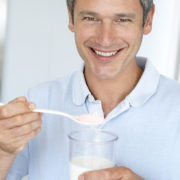‘Best Supplements for Men Over 40’: Fifteen for Health, Muscle, and Testosterone
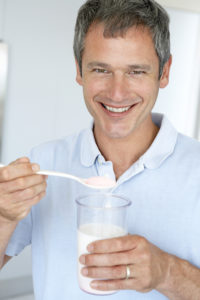 If you’re a man over 40, you want the best bang for your buck when choosing supplements for the health, strength, and muscle of a mature man. But picking the best supplements for men over 40 cannot be a one-size-fits-all formula. It works best when somewhat self-prescriptive to one’s individual needs and goals.
If you’re a man over 40, you want the best bang for your buck when choosing supplements for the health, strength, and muscle of a mature man. But picking the best supplements for men over 40 cannot be a one-size-fits-all formula. It works best when somewhat self-prescriptive to one’s individual needs and goals.
With that in mind, we can narrow down the choices by identifying a set of stand-out dietary supplements. These are the ones shown to make a difference in challenges specific to reaching our 5th decade – the best supplements for guys 40 and above.
Men over 40 Need to tackle 3 Main Challenges
The age of 40 is an interesting time for a man. When we hit this age, we’re mature; not a kid anymore. But we’re typically still youthful enough to “pivot” if we’ve lived the wild life and let ourselves go in our 20s and 30s.
Pivoting into healthier life choices usually includes improved eating habits. However, many of us find it challenging to ‘eat healthy’ in our busy and fast-paced world. This is where some well chosen dietary supplements can really help out.
And the areas usually requiring the most help are three-fold. We need to improve and/or maintain our general health, boost/sustain testosterone, and reverse/counter age-related muscle loss (sarcopenia).
- Improve/Maintain Health
- Boost/Sustain Testosterone
- Reverse/Prevent Sarcopenia
Incidentally, these three areas happen to possess a lot of overlap. Improving and maintaining general health can boost testosterone. A higher average testosterone level can definitely slow down sarcopenia. And evidence even shows that successfully reversing sarcopenia (building muscle) can positively affect long-term health by lowering risk of cancer.
So let’s look at the 15 best supplements for men over 40, along with the reasoning for each supplement making the list. We’ll begin with ten supplements that can directly affect all three areas – testosterone, muscle mass, and health. Then we’ll look at ten for which one or two of these three areas are directly affected.
Be sure to consult with your doctor before adding any supplement to your diet, as well as about appropriate dosages.
1. Fish Oil (Health, Testosterone, Sarcopenia)
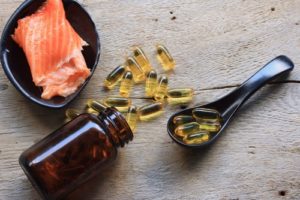
If you don’t like eating salmon at least twice a week, you probably can’t go wrong using a fish oil supplement. Taking in some fish oil each day helps you get enough anti-inflammatory Omega-3 fatty acids to balance out the pro-inflammatory Omega-6 fatty acids present in processed foods and cooking oils. This helps promote heart health and overall cardiovascular strength for men over 40.
In addition, Omega-3s from fish oil have been shown to be important for maintaining optimal cognitive function.
Fish oil increases cell permeability which, among other things, can improve insulin sensitivity. Since the opposite (insulin resistance) is at least associated with testosterone decline, fish oil might indirectly help maintain testosterone levels.
Now there’s evidence that fish oil is ‘anabolic’, especially in older men. One study showed that two capsules of fish oil per day can significantly increase muscle size in people over age 60. But there’s certainly nothing saying we can’t gain that advantage well before we turn 60.
2. Vitamin E (Health, Testosterone, Sarcopenia)
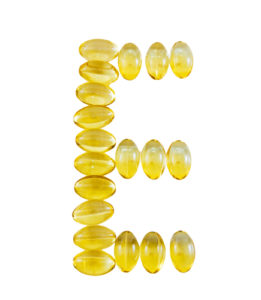
This vitamin is the most powerful antioxidant for countering lipid peroxidation. That means Vitamin E fights free radicals created by cellular respiration within lipid plasma membranes. One area where lipid peroxidation occurs heavily is within the testes during the production of testosterone.
For this reason, by the age of forty, lipid peroxidation might be a primary cause of age-related testosterone decline. Adequate levels of Vitamin E appear to be the best defense against the threat of this drop. One study showed that 400 IU daily of Vitamin E supplementation resulted in a 30% increase in the testosterone of middle-aged men within eight weeks.
That might not sound impressive, but here’s the clincher.
When human chorionic gonadotropin (HCG) was administered after the eight weeks of Vitamin E supplementation, endogenous testosterone rose rapidly by up to 82%. That’s enough to show evidence of Vitamin E’s importance in defending the testes against lipid peroxidation, thus maximizing/maintaining natural testosterone in guys over 40.
3. Vitamin C (Health, Testosterone, Sarcopenia)
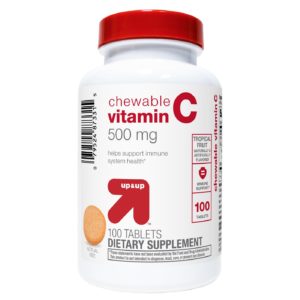 This most famous of vitamins just might help to protect the body’s testosterone producing machinery. Used in combination with Vitamin E, they create an antioxidant fortress that can protect the leydig cells from some of the damage associated with aging.
This most famous of vitamins just might help to protect the body’s testosterone producing machinery. Used in combination with Vitamin E, they create an antioxidant fortress that can protect the leydig cells from some of the damage associated with aging.
At least this can be extrapolated from animal studies. One such study showed that high levels of ascorbic acid (Vitamin C) significantly reduced lipid peroxidation levels in the testes of rats. It resultantly caused a significant boost in epididymal sperm concentration and plasma testosterone.
Since Vitamin C is also known to significantly lower cortisol, it’s a terrific supplement for helping fight sarcopenia and boost general health.
4. Vitamin D3 (Health, Testosterone, Sarcopenia)
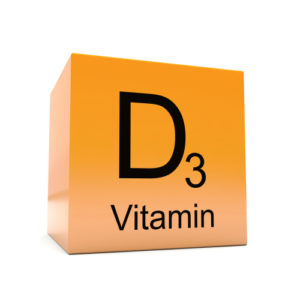 The ‘sunshine vitamin’ is another nutrient that can help boost all three areas of concern for men over forty. It’s actually a misnomer to call this a vitamin as it acts more like a hormone in the body. Regardless, unless you’re a sun worshipper or you live near the equator, there’s a good chance you’re not getting enough skin absorbing ultraviolet rays to keep Vitamin D levels high enough for optimal health.
The ‘sunshine vitamin’ is another nutrient that can help boost all three areas of concern for men over forty. It’s actually a misnomer to call this a vitamin as it acts more like a hormone in the body. Regardless, unless you’re a sun worshipper or you live near the equator, there’s a good chance you’re not getting enough skin absorbing ultraviolet rays to keep Vitamin D levels high enough for optimal health.
One meta-study revealed that people with high levels of Vitamin D tend to live longer than those with lower levels. Another study showed that the higher a cancer patient’s Vitamin D level, the better chance of their surviving the disease. Yet another study has shown an association between high Vitamin D and protection from heart failure, a common threat to men’s health after age forty.
What about Vitamin D and testosterone?
A study done on 2,300 men who were just over age sixty revealed that only 11% had adequate Vitamin D levels. What’s more, the men in the study showed a correlation between Vitamin D and testosterone; the higher the blood levels of Vitamin D, the greater the levels of both total testosterone and free testosterone.
What about Vitamin D for combating sarcopenia?
One study revealed an association between high Vitamin D levels and greater muscle mass. This might be due to Vitamin D’s tendency to lower myostatin. In addition, a test tube study showed that Vitamin D actually helps speed up muscle growth.
Although these experiments show that adequate Vitamin D is beneficial compared to low levels – by the same token, too high of Vitamin D can be as detrimental as a deficiency. Therefore, it’s important to get blood levels tested and adjust supplementation accordingly.
5. Magnesium (Health, Testosterone, Sarcopenia)
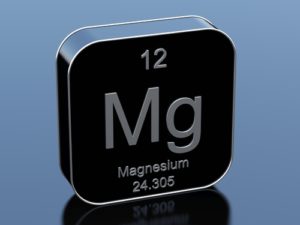 This mineral isn’t only among the best supplements for men over 40; it’s among one of the best minerals for people to supplement, period. It’s estimated that up to 70% of the population is deficient. And although green leafy vegetables whole grains should be great sources, soil depletion of minerals almost guarantees many of us need a supplemental daily hit of magnesium.
This mineral isn’t only among the best supplements for men over 40; it’s among one of the best minerals for people to supplement, period. It’s estimated that up to 70% of the population is deficient. And although green leafy vegetables whole grains should be great sources, soil depletion of minerals almost guarantees many of us need a supplemental daily hit of magnesium.
For guys over 40, magnesium supplementation can boost testosterone. This has been shown in at least a couple of studies. One revealed that a gram of magnesium per day can raise testosterone by 25%. However, this study was done on young athletes (aged 18-22).
Another study was done on elderly male subjects (aged 65-92). This one showed an age-adjusted association between magnesium levels and the anabolic hormones testosterone and IGF-1. Although there’s no proof of cause-and-effect, the correlation showed that the higher the blood magnesium, the higher those anabolic hormones. Researchers think this is because magnesium increases antioxidant enzymes and reduces cellular inflammation.
More testosterone means more muscle strength and mass. But there’s also direct evidence of magnesium combating sarcopenia. An epidemiologic study reveals a correlation between magnesium levels and muscle strength among older people. The more magnesium 60-70 year-olds have in their blood, the more muscle mass and strength they maintained.
Being above the 40-year old mark is a great time to make sure you’re getting enough magnesium.
6. Olive Leaf Extract (Health, Testosterone, Sarcopenia)
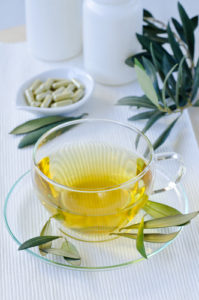 This relatively little-known supplement can have major benefits for men over forty. While the monounsaturated fat of olive oil is widely touted, the benefits derived from extract of olive leaves (oleuropein) are just recently becoming realized.
This relatively little-known supplement can have major benefits for men over forty. While the monounsaturated fat of olive oil is widely touted, the benefits derived from extract of olive leaves (oleuropein) are just recently becoming realized.
One animal study showed that oleuropein can boost testosterone, reduce cortisol, and increase anabolism. Researchers think this effect is due to the extract’s ability to raise adrenalin and noradrenalin. This, in turn, resulted in a boosting of luteinizing hormone (LH) which stimulates testosterone production in the testes.
Better yet, a human study revealed that oleuropein can increase insulin sensitivity. The study was a 12-week experiment in which researchers gave 46 healthy men (aged 35-55) 51.1 mg. of oleuropein per day. When the researchers measured the men’s insulin response to glucose at the end of the period, their insulin sensitivity was statistically improved over placebo.
Greater insulin sensitivity means oleuropein can contribute to reduced body fat, increased muscle, and better health.
In addition, oleuropein is a powerful antioxidant with anti-inflammatory qualities to boot. It’s an all-around great additive for men over forty to put in their supplementary arsenal.
7. Tumeric/Curcumin (Health, Testosterone, Sarcopenia)
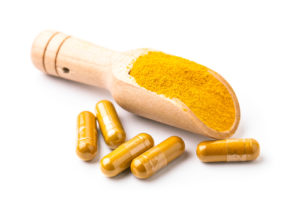 When men pass the age of forty, many of the abuses we’ve allowed our bodies to sustain over the years begin rearing their ugly heads in the form of inflamed joints and tendons.
When men pass the age of forty, many of the abuses we’ve allowed our bodies to sustain over the years begin rearing their ugly heads in the form of inflamed joints and tendons.
Along to the rescue comes the spice phenol tumeric. More specifically, it’s the curcumin that’s in the spice that provides the benefits. Curcumin has been shown effective in tamping down the inflammation that causes joint pain. It can also help raise testosterone and counter sarcopenia. And on a more macro level, its general health boosting qualities are becoming ever more widely recognized.
One animal study revealed that curcumin can increase testosterone by protecting the testes against oxidative damage. This is important given that men are constantly told their testosterone drops 1% annually after age 40. While many who mention this never provide a reason or remedy, studies like this just might grant both.
There’ve also been animal studies showing curcumin to be either anabolic or anti-catabolic. Although the exact mechanisms haven’t been identified, the result is more net muscle in either case.
Furthermore, a study on the cognitive-enhancing effects of curcumin showed it improved memory ability in people aged 50 to 90.
The best tumeric/curcumin supplements are probably those with the black pepper extract piperine added to them. That’s because curcumin is poorly absorbed by itself and research shows that a ‘piperine delivery’ helps circumvent this problem.
Tumeric/curcumin falls into our category of supplements providing a three-pronged benefit for men over forty.
8. EMIQ – Enzymatically Modified Iso-Quercetin (Health, Testosterone, Sarcopenia)
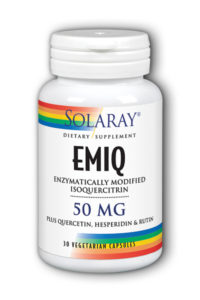 Here’s a results-producing supplement of which many people are unaware. Nevertheless, we rank it high among supplements for men over forty as it can have a positive effect on health, testosterone, and sarcopenia.
Here’s a results-producing supplement of which many people are unaware. Nevertheless, we rank it high among supplements for men over forty as it can have a positive effect on health, testosterone, and sarcopenia.
Studies reveal that the anti-oxidant flavonoid quercetin can boost testosterone, reduce cortisol, improve stamina, and even increase muscle growth. EMIQ is a highly bio-absorbable form of quercetin, making it easier to get health-boosting effects of quercetin with low doses of EMIQ.
One animal study showed that EMIQ has an anabolic effect on overloaded (resistance trained) muscles. The experiment resulted in muscle gain even in animals that were given EMIQ but not subjected to muscle overload. This might be due to quercetin significantly reducing cortisol levels and improving mitochondrial activity in muscle cells.
There’s also evidence that quercetin can boost testosterone. This has been shown in animal studies in which subjects were given high doses of onion juice. The onion juice lowered the level of oxidative stress in the animal’s testes, an effect researchers attribute, at least in part, to quercetin in onions.
Given the anti-oxidative effect of quercetin in phospholipids, EMIQ can be an effective supplement for men over forty in fighting lipid peroxidation.
9. Ashwagandha (Health, Testosterone, Sarcopenia)
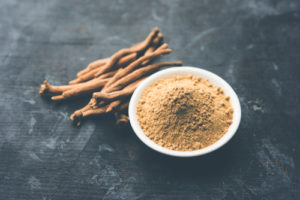 This herb from India is often used for fighting anxiety and reducing cortisol. That’s because ashwagandha is an adaptogen, a botanical that can help the body in managing stress. Just its cortisol blunting quality is enough to be of value to the man over 40 that feels stress overload creeping into his life.
This herb from India is often used for fighting anxiety and reducing cortisol. That’s because ashwagandha is an adaptogen, a botanical that can help the body in managing stress. Just its cortisol blunting quality is enough to be of value to the man over 40 that feels stress overload creeping into his life.
But ashwagandha is a possible testosterone booster and muscle builder as well. One study showed that 5 grams per day raised testosterone by 40% within 90 days. Another experiment revealed that weight trainers who took a 600 mg. ashwagandha supplement gained significantly more muscle than a placebo group. This could be due to either the herb’s testosterone boosting effect or its anti-catabolic effect, or both.
Added to this are the evidence that ashwagandha reduces blood sugar, inflammation, and even the symptoms of depression. This becomes a must-try supplement for certain men over forty.
10. Probiotics (Health, Testosterone, Sarcopenia)
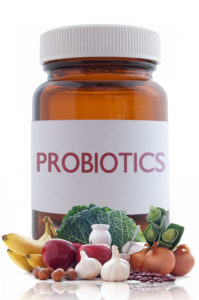 These are bacteria that our bodies actually need; so-called “good bacteria.” In fact, our intestines are naturally teeming with probiotics, affecting how well we digest and absorb certain nutrients in our diets.
These are bacteria that our bodies actually need; so-called “good bacteria.” In fact, our intestines are naturally teeming with probiotics, affecting how well we digest and absorb certain nutrients in our diets.
The right balance of these types of bacteria has recently been found to affect health, and even testosterone and muscle strength, at least in animal studies. One such study showed that the probiotic Lactobacillus reuteri ATCC 6475 preserved the youthful gonad size and testosterone production of aging rats. Another animal study showed that Lactobacillus plantarum TWK10 increased muscle mass and exercise performance in mice.
Although probiotics can be bought in supplement form, the most reliable source might be the addition of a good probiotic yogurt in your diet. Research shows that homemade yogurt is the best source, seconded by a high quality store-bought probiotic yogurt.
11. Vitamin K (Health, Testosterone)
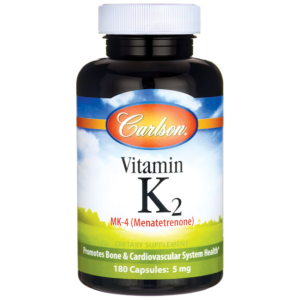 This vitamin actually comes in two forms, K1 and K2. Vitamin K1 is naturally available in green leafy vegetables. Vitamin K2 is most heavily present in fish eggs, cheddar cheese, and fermented foods like German saurkrout and Japanese natto.
This vitamin actually comes in two forms, K1 and K2. Vitamin K1 is naturally available in green leafy vegetables. Vitamin K2 is most heavily present in fish eggs, cheddar cheese, and fermented foods like German saurkrout and Japanese natto.
While both forms of the vitamin are critical for blood coagulation, vitamin K2 is important for the functioning of certain enzymes. These enzymes are vital for everything from skeletal calcium uptake to testosterone production.
Vitamin K2 is further divided between two different types called MK4 and MK7. Both forms are required for general health, but MK4 is associated with higher testosterone production based on an animal study. When rats were given higher amounts in their diets, testicular enzymes that convert cholesterol to testosterone were increased. This resulted in significantly higher testosterone levels compared to the control group.
Intake of MK4 and MK7 can be increased by eating more fermented food, along with grass-fed cow butter and/or fish eggs. But if these foods aren’t accessible or palatable, Vitamin K should be on a guy’s watch list of best supplements for men over 40.
12. Coenzyme Q10 (Health)
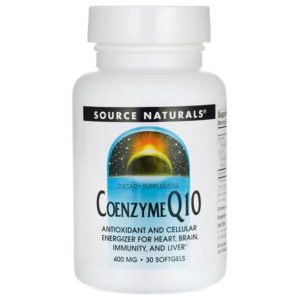 This important antioxidant is produced naturally by the body. But coenzyme Q10 production decreases with age. This results in levels dropping after age forty. And although ‘CoQ10’ is present in some foods we eat, those sources are unlikely to provide compensation for age-related decline.
This important antioxidant is produced naturally by the body. But coenzyme Q10 production decreases with age. This results in levels dropping after age forty. And although ‘CoQ10’ is present in some foods we eat, those sources are unlikely to provide compensation for age-related decline.
Studies have shown that supplementing with CoQ10 can reduce inflammatory factors that contribute to metabolic disorder.
In addition, animal studies reveal that insulin resistance might be at least partially attributable to reduced mitochondrial CoQ10 levels. Restoring the animal’s levels of this antioxidant with supplementation resulted in improved insulin sensitivity. The human equivalent of the dose for this effect was 160 mg. of CoQ10 per day.
There’s also evidence that CoQ10 can protect against the chances of heart failure caused by left ventricular hypertrophy. This is likely due to the antioxidant’s ability to generate cellular energy via a recharging of the mitochondria.
Since statin drugs can reduce natural levels of CoQ10, this is a supplement that guys over 40 who are prescribed those drugs should definitely discuss with their physicians.
13. Creatine (Health, Sarcopenia)
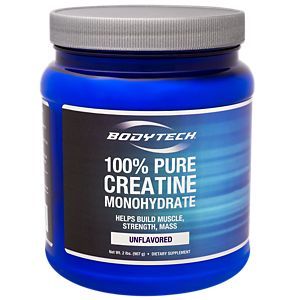 This ubiquitous supplement has already been used by multitudes of men over age 40. It was likely sitting in the pantry of many such guys while they were struggling to put on solid weight in their teens and early twenties.
This ubiquitous supplement has already been used by multitudes of men over age 40. It was likely sitting in the pantry of many such guys while they were struggling to put on solid weight in their teens and early twenties.
It turns out that creatine might be more beneficial to us now than when we were younger. That’s due to the discovery that supplemental dosages of the compound could provide neuro-protective benefits. What’s more, an animal study reveals that combining creatine with CoQ10 might provide greater neuro-protective benefit than either supplement by itself.
In that study, mice were genetically modified to take on characteristics that closely resemble those of Parkinson’s disease and Huntington’s disease. Based on the theory that the courses of these diseases are simply sped up versions of normal aging, the effect the supplements would have on the study’s subjects might reveal anti-aging benefits.
The animals given either creatine or CoQ10 showed significantly less disease progression than the animals in the control group. Furthermore, each of these two groups had a longer lifespan than those in the control. But the test group given both creatine and CoQ10 showed the slowest disease progression and lived 22% longer than the mice given neither supplement.
On the muscle sparing front, creatine has been discovered to be a myostatin inhibitor. Myostatin is a protein within muscle itself that limits its growth. By limiting myostatin, we can enhance muscle protein synthesis and hypertrophy (growth).
So while we once thought creatine was only good for improving repetitions during workouts, it might very well be effective in reducing the chance of both sarcopenia and neurodegenerative disease.
14. Epicatechin (Health, Sarcopenia)
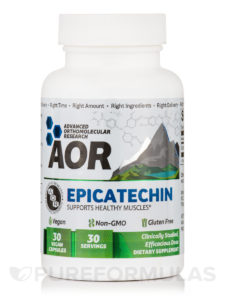 Many of us are already aware that there are health benefits of eating dark chocolate. But it’s cocoa’s antioxidant (epicatechin) that’s most important in giving the bittersweet food these characteristics.
Many of us are already aware that there are health benefits of eating dark chocolate. But it’s cocoa’s antioxidant (epicatechin) that’s most important in giving the bittersweet food these characteristics.
One study showed that epicatechin might be an excellent flavonoid for combating sarcopenia. In the experiment, supplementation with epicatechin inhibited myostatin and boosted follistatin. This happened in both human and animal subjects. Since myostatin impedes muscle growth and follistatin supports it, this resulted in improved hand strength in the study’s elderly human subjects.
Animal studies show that epicatechin can combat the effects of aging and extend lifespan. This is likely due to its ability to increase both the AMPK enzyme and the super-oxide dismutase antioxidant.
When combined with creatine supplementation, epicatechin boosts muscle building efforts via both supplement’s myostatin inhibiting effects.
15. Vitamin B12 (Health)
 This vitamin is necessary for normal energy levels and nervous system functioning. Thus, a deficiency can contribute to fatigue and cognitive impairment. And since the best food sources include beef, eggs, and poultry, most guys over 40 probably think they have this covered since they’re naturally on the carnivorous side.
This vitamin is necessary for normal energy levels and nervous system functioning. Thus, a deficiency can contribute to fatigue and cognitive impairment. And since the best food sources include beef, eggs, and poultry, most guys over 40 probably think they have this covered since they’re naturally on the carnivorous side.
But many men show a deficiency of B12 after age forty. The underlying culprit is absorption; the vitamin becomes harder to derive from food as we age. Certain medications can exacerbate this problem even further. Therefore, men over forty who are on medication and/or avoid eating animal protein sources should definitely get their B12 levels checked.
The toxicity threshold for this Vitamin B12 is high and excess levels are stored by the body. For these reasons, it should be on every man’s watch list of best supplements to take after age forty.
The Bottom Line on Supplements for Over-40 Men
Any dietary supplementation program needs to be specially tailored to a person’s specific needs and objectives. It also should only be pursued with the consent of one’s personal physician or medical professional.
But knowledge is power, and that’s what the list of 15 ‘best supplements for men over 40’ represents. It’s the power of acquired insight regarding which available supplements might be chosen and combined in a safe manner to address particular dietary shortcomings or meet personal health goals.
References
- Artemis P. Simopoulos. ‘The Importance of the Omega-6/Omega-3 Fatty Acid Ratio in Cardiovascular Disease and Other Chronic Diseases.’ Experimental Biology and Medicine (Vol. 233, Issue 6) June 2008
- Yasuhiro Ishihara, Kouichi Itoh, Miki Tanaka, Mayumi Tsuji, Toshihiro Kawamoto, Suguru Kawato, Christoph F. A. Vogel & Takeshi Yamazaki. ‘Potentiation of 17β-estradiol synthesis in the brain and elongation of seizure latency through dietary supplementation with docosahexaenoic acid.’ Scientific Reports (Issue #7, Article number: 6268) July 2017
- Matthew F. Muldoon, Kirk I. Erickson, Bret H. Goodpaster, John M. Jakicic, Sarah M. Conklin, Akira Sekikawa, Jeffrey K. Yao, Stephen B. Manuck. ‘Concurrent Physical Activity Modifies the Association between n3 Long-Chain Fatty Acids and Cardio-metabolic Risk in Midlife Adults.’ The Journal of Nutrition (Volume 143, Issue 9, Pages 1414–1420) Sept. 2013
- Smith GI, Julliand S, Reeds DN, Sinacore DR, Klein, Mittendorfer. ‘Fish oil-derived n-3 PUFA therapy increases muscle mass and function in healthy older adults.’ The American Journal of Clinical Nutrition (Volume 102, Issue 1, Pages 115–122) July 2015
- Andrew S. Midzak, Haolin Chen, Vassilios Papadopoulos, Barry R. Zirkin. ‘Leydig cell aging and the mechanisms of reduced testosterone synthesis.’ Molecular and Cellular Endocrinology (Issue 299, pgs 23 – 31) July 2008
- Fumio Meda, Ken-Ichi Kato, Kazuo Muta, Hiroshi Ibayashi. ‘Effect of Vitamin E on Function of Pituitary-Gonadal Axis in Male Rats and Human Subjects.’ Endocrinologia Japonica (Vol. 29, Issue 3, pgs 287-292) 1982
- Mustafa Sönmez, Gaffari Türk, Abdurrauf Yüceb. ‘The effect of ascorbic acid supplementation on sperm quality, lipid peroxidation and testosterone levels of male Wistar rats.’ Theriogenology (Vol. 63, Issue 7, Pgs. 2063-2072) April 2005
- Schöttker B, Jorde R, Peasey A, Thorand B, Jansen EH, Groot Ld, Streppel M, Gardiner J, Ordóñez-Mena JM, Perna L, Wilsgaard T, Rathmann W, Feskens E, Kampman E, Siganos G, Njølstad I, Mathiesen EB, Kubínová R, Pająk A, Topor-Madry R, Tamosiunas A, Hughes M, Kee F, Bobak M , Trichopoulou A, Boffetta P, Brenner H. ‘Vitamin D and mortality: meta-analysis of individual participant data from a large consortium of cohort studies from Europe and the United States.’ British Medical Journal (348:g3656. doi: 10.1136/bmj.g3656.) June 2014
- Tretli S, Schwartz GG, Torjesen PA, Robsahm TE. ‘Serum levels of 25-hydroxyvitamin D and survival in Norwegian patients with cancer of breast, colon, lung, and lymphoma: a population-based study.’ Cancer Causes & Control (Vol. 23, Issue 2, pp 363–370) Feb 2012
- Catarina Magalhães Porto, Vanessa De Lima Silva, João Soares Brito da Luz, Brivaldo Markman Filho, Vera Magalhães da Silveira. ‘Association between vitamin D deficiency and heart failure risk in the elderly.’ Catarina Magalhães Porto, Vanessa De Lima Silva, João Soares Brito da Luz, Brivaldo Markman Filho, Vera Magalhães da Silveira. ‘Association between vitamin D deficiencyand heart failure risk in the elderly.’ ESC Heart Failure (https://doi.org/10.1002/ehf2.12198) Aug. 2017
- Wehr S. Pilz B. O. Boehm W. März B. Obermayer‐Pietsch. ‘Association of vitamin D status with serum androgen levels in men.’ Clinical Endocrinology (Vol. 73, Issue2) Aug. 2010
- Prapimporn Chattranukulchai Shantavasinkul, M.D., Pariya Phanachet, M.D., Orawan Puchaiwattananon, Ph.D., La-or Chailurkit, Ph.D., Tanarat Lepananon, M.Sc., Suwannee Chanprasertyotin, M.Sc., Boonsong Ongphiphadhanakul, M.D., Daruneewan Warodomwichit. ‘Vitamin D status is a determinant of skeletal muscle mass in obesity according to body fat percentage.’ Nutrition (Vol. 31, Issue 6, Pgs. 801–806) June 2015
- Garcia LA, King KK, Ferrini MG, Norris KC, Artaza JN. ‘1,25(OH)2vitamin D3 stimulates myogenic differentiation by inhibiting cell proliferation and modulating the expression of promyogenic growth factors and myostatin in C2C12 skeletal muscle cells.’ Endocrinology (152{8}2976-86) June 2011
- Cinar V, Polat Y, Baltaci AK, Mogulkoc R. ‘Effects of magnesium supplementation on testosterone levels of athletes and sedentary subjects at rest and after exhaustion.’ Biological Trace Element Research (, 140, Issue 1, pp 18–23) April 2011
- Maggio M, Ceda GP, Lauretani F, Cattabiani C, Avantaggiato E, Morganti S, Ablondi F, Bandinelli S, Dominguez LJ, Barbagallo M, Paolisso G, Semba RD, Ferrucci L. ‘Magnesium and anabolic hormones in older men.’ International Journal of Andrology (Vol. 34, Issue 6, pt 2) Dec 2011
- Ligia J Dominguez, Mario Barbagallo, Fulvio Lauretani, Stefania Bandinelli, Angelo Bos, Anna Maria Corsi, Eleanor M Simonsick, Luigi Ferrucci. ‘Magnesium and muscle performance in older persons.’ The American Journal of Clinical Nutrition (Vol. 84, Issue 2, Pages 419–426) Aug. 2006
- Oi-Kano Y, Kawada T, Watanabe T, Koyama F, Watanabe K, Senbongi R, Iwai K. ‘Oleuropein supplementation increases urinary noradrenaline and testicular testosterone levels and decreases plasma corticosterone level in rats fed high-protein diet.’ The Journal of Nutritional Biochemistry (Vol. 24, Issue 5, Pages 887-893) May 2013
- Martin de Bock, José G. B. Derraik, Christine M. Brennan, Janene B. Biggs, Philip E. Morgan, Steven C. Hodgkinson, Paul L. Hofman, Wayne S. Cutfield. ‘Olive (Olea europaea L.) Leaf Polyphenols Improve Insulin Sensitivity in Middle-Aged Overweight Men: A Randomized, Placebo-Controlled, Crossover Trial.’ PLOS (https://doi.org/10.1371/journal.pone.0057622) March 2013
- Imed Hassen, Hervé Casabianca, Karim Hosnic. ‘Biological activities of the natural antioxidant oleuropein: Exceeding the expectation – A mini-review.’ Journal of Functional Foods (Vol. 18, Part B, Pages 926-940) Oct. 2015
- Abarikwu SO, Akiri OF, Durojaiye MA, Alabi AF. ‘Combined administration of curcumin and gallic acid inhibits gallic acid-induced suppression of steroidogenesis, sperm output, antioxidant defenses and inflammatory responsive genes.’ The Journal of Steroid Biochemistry and Molecular Biology (Vol. 143, Pages 49-60) Sept 2014
- Vazeille E1, Slimani L, Claustre A, Magne H, Labas R, Béchet D, Taillandier D, Dardevet D, Astruc T, Attaix D, Combaret L. ‘Curcumin treatment prevents increased proteasome and apoptosome activities in rat skeletal muscle during reloading and improves subsequent recovery.’ The Journal of Nutritional Biochemistry (Vol., Issue 3, Pages 245-251) March 2012
- Gary W.Small M.D., PrabhaSiddarth PhD., Zhaoping Li M.D., Ph.D. ‘Memory and Brain Amyloid and Tau Effects of a Bioavailable Form of Curcumin in Non-Demented Adults: A Double-Blind, Placebo-Controlled 18-Month Trial.’ The American Journal of Geriatric Psychiatry (Vol. 26, Issue 3, Pages 266-277) March 2018
- Shoba G1, Joy D, Joseph T, Majeed M, Rajendran R, Srinivas PS. ‘Influence of piperine on the pharmacokinetics of curcumin in animals and human volunteers.’ Planta Med 64(4):353-6 May 1998
- Akiko Kohara, Masanao Machida, Yuko Setoguchi, Ryouichi Ito, Masanori Sugitani, Hiroko Maruki-Uchida, Hiroyuki Inagaki, Tatsuhiko Ito, Naomi Omi and Tohru Takemasa. ‘Enzymatically modified isoquercitrin supplementation intensifies plantaris muscle fiber hypertrophy in functionally overloaded mice.’ Journal of the International Society of Sports Nutrition (https://doi.org/10.1186/s12970-017-0190-y) Sept. 2017
- Khaki A, Fathiazad F, Nouri M, Khaki AA, Khamenehi HJ, Hamadeh M. ‘Evaluation of androgenic activity of allium cepa on spermatogenesis in the rat.’ Folia Morphologica (Vol. 68, No 1) Nov. 2008
- Vijay R. Ambiye, Deepak Langade, Swati Dongre, Pradnya Aptikar, Madhura Kulkarni, Atul Dongre. ‘Clinical Evaluation of the Spermatogenic Activity of the Root Extract of Ashwagandha (Withania somnifera) in Oligospermic Males: A Pilot Study.’ Evidence-Based Complementary and Alternative Medicine (Article ID 571420, 6 pages) Nov. 2013
- Sachin Wankhede, Deepak Langade, Kedar Joshi, Shymal R. Sinha and Sauvik Bhattacharyya. ‘Examining the effect of Withania somnifera supplementation on muscle strength and recovery: a randomized controlled trial.’ Journal of the International Society of Sports Nutrition (2015 12:43, https://doi.org/10.1186/s12970-015-0104-9) Nov. 2015
- Theofilos Poutahidis , Alex Springer , Tatiana Levkovich, Peimin Qi, Bernard J. Varian, Jessica R. Lakritz, Yassin M. Ibrahim, Antonis Chatzigiagkos, Eric J. Alm , Susan E. Erdman. ‘Probiotic Microbes Sustain Youthful Serum Testosterone Levels and Testicular Size in Aging Mice.’ PLOS ONE (https://doi.org/10.1371/journal.pone.0084877) Jan 2014
- Yi-Ming Chen, Li Wei, Yen-Shuo Chiu, Yi-Ju Hsu, Tsung-Yu Tsai, Ming-Fu Wang, Chi-Chang Huang. ‘Lactobacillus plantarum TWK10 Supplementation Improves Exercise Performance and Increases Muscle Mass in Mice.’ Nutrients (Vol. 8, Issue 4) April 2016
- Peter Weber MD, PhD. ‘Vitamin K and bone health.’ Nutrition (Vol. 17, Issue 10, Pgs. 880-887) Oct. 2001
- Asagi Ito, Hitoshi ShirakawaEmail author, Naofumi Takumi, Yoshihiko Minegishi, Ai Ohashi, Zakir H Howlader, Yusuke Ohsaki, Toshiro Sato, Tomoko Goto and Michio Komai. ‘Menaquinone-4 enhances testosterone production in rats and testis-derived tumor cells.’ Lipids in Health and Disease (201110:158 https://doi.org/10.1186/1476-511X-10-158) Sept 2011
- Junya Zhai, Yacong Bo, Yan Lu, Chunli Liu, Lishi Zhang. ‘Effects of Coenzyme Q10 on Markers of Inflammation: A Systematic Review and Meta-Analysis.’ PLOS ONE (https://doi.org/10.1371/journal.pone.0170172) Jan 2017
- Daniel J Fazakerley, Rima Chaudhuri, Pengyi Yang, Ghassan J Maghzal, Kristen C Thomas, James R Krycer, Sean J Humphrey, Benjamin L Parker, Kelsey H Fisher-Wellman. ‘Mitochondrial CoQ deficiency is a common driver of mitochondrial oxidants and insulin resistance.’ eLife Sciences (DOI: 10.7554/eLife.32111) Feb. 2018
- Langsjoen PH1, Langsjoen A, Willis R, Folkers K. ‘Treatment of hypertrophic cardiomyopathy with coenzyme Q10.’ Molecular Aspects of Medicine (Vol. 18, pp. 145-151) 1997
- Lichuan Yang Noel Y. Calingasan Elizabeth J. Wille Kerry Cormier Karen Smith Robert J. Ferrante M. Flint Beal. ‘Combination therapy with Coenzyme Q10 and creatine produces additive neuroprotective effects in models of Parkinson’s and Huntington’s Diseases.’ Journal of Neurochemistry (Vol. 109, Issue 5, Pgs. 1427-1439) June 2009
- Christopher Brooks Mobley, Carlton D Fox, Brian S Ferguson, Rajesh H Amin, Vincent J Dalbo, Shawn Baier, John A Rathmacher, Jacob M Wilson and Michael D Roberts. L-leucine, beta-hydroxy-beta-methylbutyric acid (HMB) and creatine monohydrate prevent myostatin-induced Akirin-1/Mighty mRNA down-regulation and myotube atrophy.’ Journal of the International Society of Sports Nutrition (https://doi.org/10.1186/1550-2783-11-38) Aug. 2014
- Gutierrez-Salmean G1, Ciaraldi TP, Nogueira L, Barboza J, Taub PR, Hogan MC, Henry RR, Meaney E, Villarreal F, Ceballos G, Ramirez-Sanchez I. ‘Effects of (-)-epicatechin on molecular modulators of skeletal muscle growth and differentiation.’ The Journal of Nutritional Biochemistry (Vol. 25, Issue 1, Pgs 91-94) Jan 2014
- Hongwei Si Zhuo Fu Pon Velayutham Anandh Babu Wei Zhen Tanya LeRoith Mary Pat Meaney Kevin A. Voelker Zhenquan Jia Robert W. Grange Dongmin Liu. ‘Dietary Epicatechin Promotes Survival of Obese Diabetic Mice and Drosophila melanogaster.’ The Journal of Nutrition (Vol. 141, Issue 6, ,Pgs. 1095–1100) June 2011
- C. Tangney, N.T. Aggarwal, H. Li, R.S. Wilson, C. DeCarli, D.A. Evans, M.C. Morris. ‘Vitamin B12, cognition, and brain MRI measures: A cross-sectional examination.’ Neurology (DOI:https://doi.org/10.1212/WNL.0b013e3182315a33) Sept. 2011
- Dharmarajan TS , Adiga GU , Norkus EP. ‘Vitamin B12 deficiency. Recognizing subtle symptoms in older adults.’ Geriatrics [58(3):30-4, 37-8] July 2003

